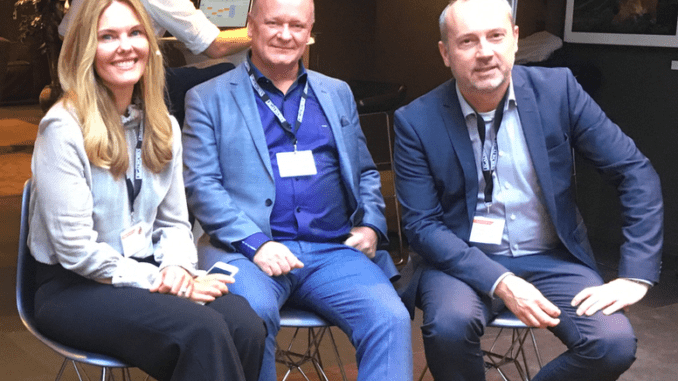
Last week Artificial Lawyer attended Nordic Legal Tech Day in Stockholm and witnessed further proof that interest in the New Wave of legal tech, especially legal AI, is now a truly global phenomenon.
The Nordic Legal Tech Day, organised by Sweden’s LegalWorks, a multi-faceted alternative legal services provider (ALSP), currently doubles in size every year it is held – proof in itself that something is happening here.
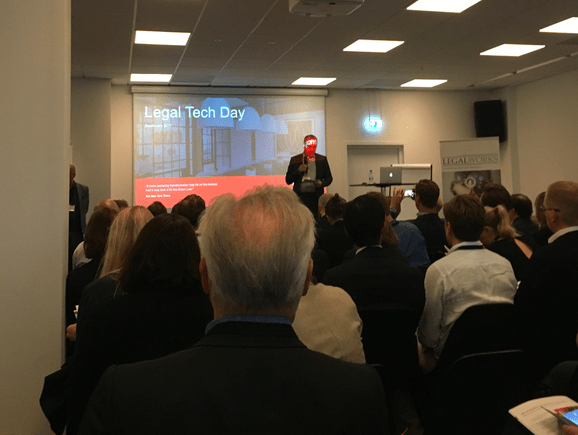
This year saw several speakers from across Scandinavia and the rest of Europe, while the large audience of general counsel (GC) and attendees from major Nordic law firms were also buzzing with energy.
The event was organised by LegalWorks’ team of CEO, Anna Lensmar-Friedman; Founder/Chairman, Leif Frykman; and Founder/COO, Ulf Lindén (pictured above in main photo, left to right).
The day kicked off with a detailed talk by Axiom’s Sandy Devine, who is Managing Director for Europe. She gave a great overview of how Axiom is bringing process and legal engineering to its clients. Devine also noted that the company, which is now global, is making use of AI systems. For example, it has previously been noted in Artificial Lawyer that Kira Systems’ doc review software is part of Axiom’s armoury of AI tools.
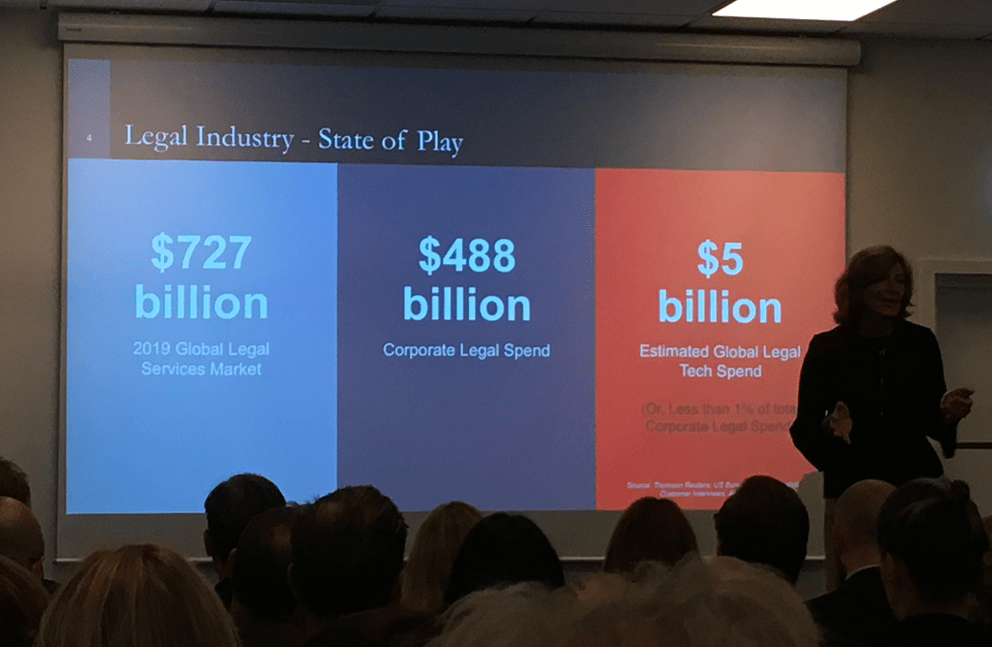
Devine added that the use of AI tools would expand and that further formal hook-ups with other legal AI companies were in the works. This expansion in the use of AI matters because even if some of the Nordic GC attendees didn’t feel they would be able to incorporate AI tools internally, e.g. NLP-driven doc review, into their team’s activities, they can certainly turn to ALSPs and law firms using AI to do so. And there were Nordic law firms in attendance, several of which were also already providing AI-driven doc review services.
In short, what perhaps a couple of years ago may have seemed a peripheral, perhaps even theoretical, subject in a legal conference in Scandinavia is clearly now front and centre.
It was also encouraging to see that the providers of AI systems were not all US, UK and Canadian. One Swedish doc management platform in particular, Precisely, is powering ahead into contract automation and now is in the developmental phase of producing AI tools for document review.
Meanwhile, VQ Legal, founded by Helena Hallgarn and Ann Björk, has been one of the early legal tech pioneers in Sweden on the contracting and KM-side and has also established VQ Forum as a venue for discussion about the future of the legal profession. They have just commenced a collaboration with IBM on an AI application.
In time, as with other markets, more AI applications will no doubt emerge from homegrown legal tech entrepreneurs in the Nordic region. And this growth will in turn add to more green shoots of AI growth in many other markets, from India to Australia. This will combine with other investments in legal tech, from doc management to collaboration systems, to drive spending on technology in the legal sector.
As Devine pointed out in her talk, legal tech spending at present is around 1% of the total spending by companies on legal advice. That was clearly set to increase. Though, she pointed out that leaping from very manual practices to AI and automation would not be a seamless process.
‘Many people are still using the artisanal model. For example, if we went back a couple of hundred years and gave a blacksmith a modern, industrial conveyor belt (from a factory), it’s hard to see how they would change,’ she noted.
That said, she also noted the rise of inhouse operations experts and the steady move toward industrialisation of the legal world. In effect, the direction of travel is clear even if we need to be aware of some of the challenges of the transition.
–
There were several other excellent sessions, including a talk on how Sweden’s Land Registry is making use of blockchain tech to enable a more secure transfer of property ownership. Another highlight was the start-up pitch session of Nordic legal tech companies and innovators, hosted by Legal Geek’s founder, Jimmy Vestbirk.
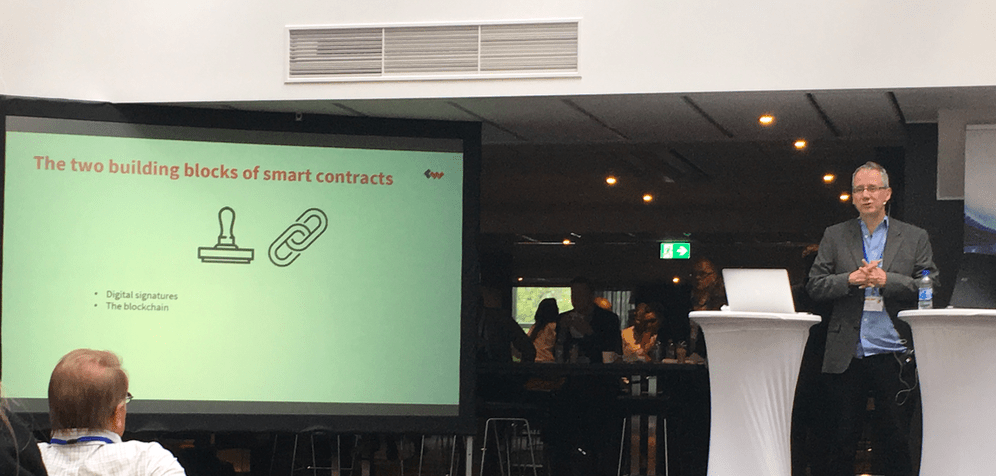
This concluded with the presentation of the Legal Innovation Award 2017, which was founded by Fredrik Svärd, who also founded legaltech.se, the main source of Nordic legal tech news. Incidentally, the winners were: VQ Legal, for most innovative company and Nils-Erik Jansson, founder of Precisely, for most innovative person of the year.
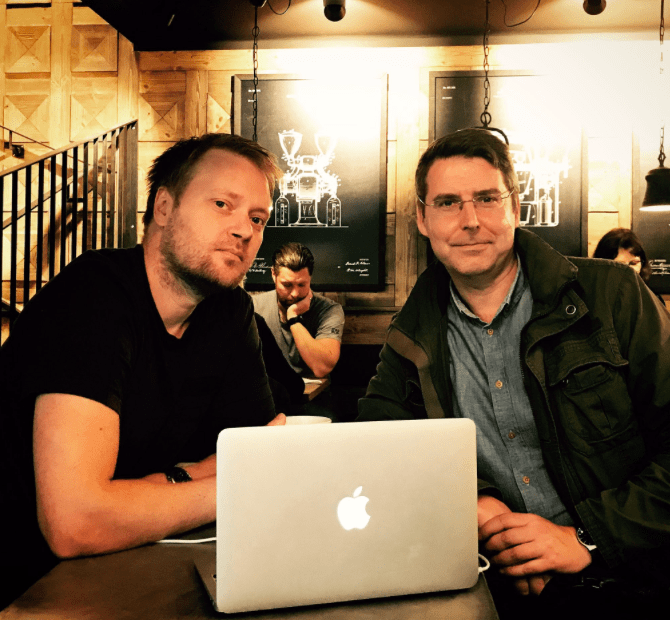
Meanwhile, the main legal AI session saw Artificial Lawyer give an overview of where we currently are in terms of AI applications for lawyers and how they are being made use of. As noted in the talk, while transactional doc review is the leader of the pack, there are a growing number of branches for advanced uses of AI technology.
Artificial Lawyer then chaired a great debate and Q&A session with Martin Blackburn, Sales Director at Luminance, Peter Wallqvist, CSO, iManage (RAVN) and Magnus Steen of CBI, which advises companies on improving contract management.
The focus of the panel was firmly on what AI can do, on a practical level. What people appeared to be most interested in were questions such as:
- can a small in-house team use an AI doc review system ‘straight out of the box’ or will the system need plenty of machine learning to be of use?
- and, if that team is small, how will they get the resources together to train that system?
- then there was the language issue. English is often used in Nordic law firms as a business language. Cross-border deals will also often involve English language contracts. But, what about the rest? Will training up a new language be difficult?
In summary, the consensus from the panel was that AI solutions will need training for tasks that are not already ‘machine-learned’ and this to some extent connected to all three of the above points.
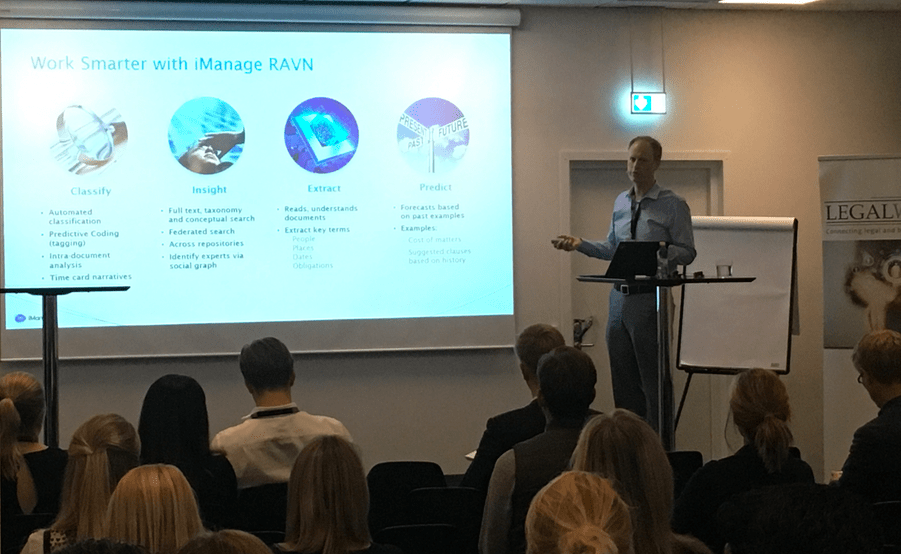
Many legal AI doc review platforms come with ‘pre-sets’, i.e. ‘recipes’ that the system is already trained with to look for certain legal clauses or other types of data in a contract. Often this can be in English, or depending on the AI company other major languages such as French, German and Spanish.
While AI is in effect ‘language agnostic’, i.e. a machine learning system can be taught to look for patterns in any kind of text, those training it naturally have to be proficient and know what they are looking for.
That inevitably means that while a Nordic law firm, or an inhouse legal team, can perhaps use an AI doc review system ‘out of the box’ to explore English language contracts in a due diligence exercise, for example, moving onto Swedish legal documents will demand additional training. Though, once that training is built in then the users have that forever.

The question then is which law firms and companies will invest the time and internal resources to do this training? The answer perhaps is not straightforward. It may not be the largest companies, nor the wealthiest law firms that move first. Training is not so much ‘expensive’ in terms of monetary cost, but more a question of committing key people in the organisation to take on the role of ‘machine teachers’ to get the AI up to speed and to the accuracy level you want for the job you have in mind and in the language you want, if it goes beyond the pre-set capabilities.
A two lawyer team could do this, if one of the lawyers was willing to devote their time to that ‘teaching’ work. Naturally, larger firms or inhouse teams have more ‘bandwidth’ to deploy those resources, but being large is no guarantee a business will be innovative.
In short, the AI session proved that the appetite for legal AI tools is just as great in the Nordics as it is in London. The challenge now is also the same as that experienced in the UK and US, which is moving from the idea of adoption to the practical reality of actually putting AI to work. The event also showed that GCs across the region take the use of advanced legal tech very seriously and want to know more.
One can therefore expect next year’s Nordic Legal Tech Day to have an even larger audience and further proof of AI adoption across the region. Looking forward to it already.